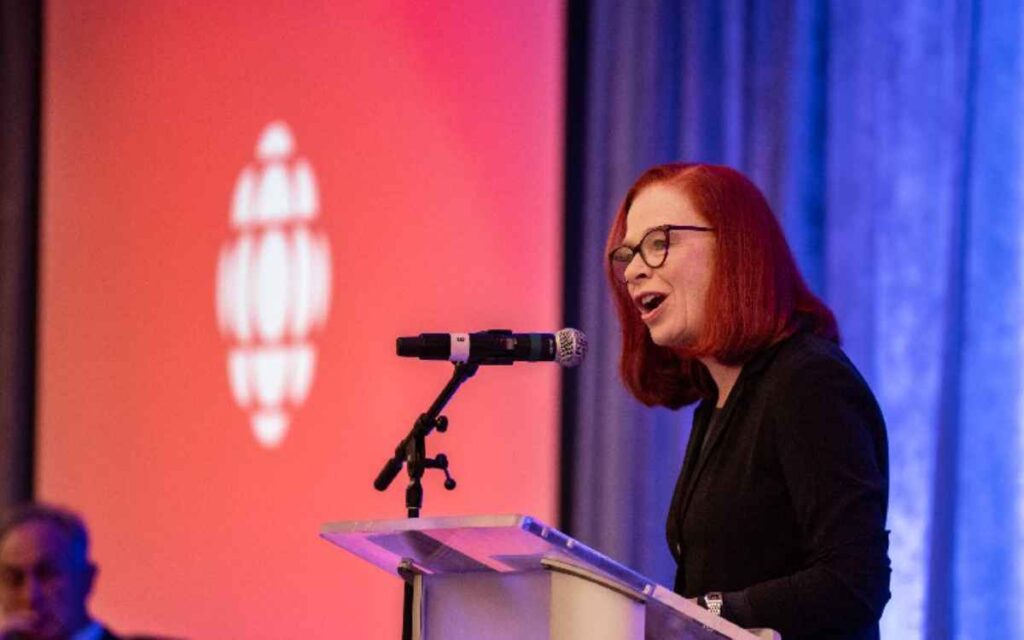
The CBC costs a ton of money and nearly nobody is watching it. Pictured: CBC President Catherine Tait. Photo Credit: Catherine Tait/X.
CBC President Catherine Tait’s office must be in The Twilight Zone because her version of the state broadcaster is stuck in an alternate dimension.
Tait testified on Parliament Hill again recently and made some interesting claims about the CBC.
Tait focused on three points: the CBC’s pay and bonuses are fine, Canadians are getting good value for money and there would be “huge impoverishment” if the state broadcaster were defunded.
First, the money.
“Will you share with this committee whether or not you will refuse a severance package or bonus at the conclusion of your term as president and CEO of the CBC?” asked MP Damien Kurek.
“I consider that to be a personal matter,” Tait responded.
It’s not personal if it’s taxpayers’ money.
Tait is paid between $460,900 and $551,600 per year, with a bonus of up to 28 per cent. That’s a bonus of up to $154,448, more than the average family earns in a year.
The CBC handed out bonuses costing $18 million this year.
The CBC is getting $1.4 billion from the government this year. That could pay the salaries of about 7,000 paramedics and 7,000 police officers. It could buy 2,400 homes in Calgary, or cover groceries for about 85,000 families for the year. Or it could cover the federal income taxes of more than 80,000 households.
Second, Tait says Canadians are seeing good value for this money.
But how can Canadians see value from the CBC when so few watch it?
CBC News Network’s audience share is 1.7 per cent, according to its latest quarterly report.
On the entertainment side, CBC doesn’t rank highly either.
The Murdoch Mysteries, which is not produced by the CBC, pulls in its biggest audience with about 812,000 people, or about 1.9 per cent of the population.
Ratings from Numeris for 2022 show CBC didn’t crack the top-10 most-viewed shows by Canadians. Its top show ranked 16th: The Great British Baking Show (spoiler alert: it’s produced in the United Kingdom).
Tait didn’t acknowledge this low rating reality at committee. She said without the CBC, the show Son of a Critch would disappear and that “would be a huge impoverishment of our status and our place on the world stage.”
The biography of government-funded comedian Mark Critch is in its third season. Last year, the show drew an average audience of about 592,000 people, or about 1.4 per cent of Canadians.
Lastly, Tait says the CBC is essential for sports and Indigenous programming. Tait told the committee, “there would be no Inuktitut in this country if not for CBC.”
Last year, the CBC spent $6.4 million on Indigenous services. That’s about 0.3 per cent of its total spending. And, according to the numbers, the CBC cares about executive bonuses more than twice as much as Indigenous services.
In contrast, there’s no billion-dollar subsidy for the Aboriginal People’s Television Network. The Winnipeg-based channel includes newscasts, online reporting and an investigative journalism team. APTN recently launched a second channel, APTN Languages, which airs 24/7 in 18 Indigenous languages.
Apparently, athletes rely on CBC and, in some cases, Tait herself.
Tait was vacationing in France when she popped over to Paris and spent $6,000 on her trip.
“I interrupted my holiday and took the four days to go to the Olympics,” Tait told committee MP Jamil Javani. “It would be concerning if the CEO of CBC-Radio Canada did not attend the opening of the Olympics, given it was one of the most important events of the calendar year.”
In what kooky alternate dimension do Canadians sit up at night, concerned about whether Tait will attend the Paris Olympics, while being thrilled to pay $6,000 for it?
The CBC costs a ton of money and nearly nobody is watching it.
It’s time to defund the CBC.
Kris Sims is the Alberta Director for the Canadian Taxpayers Federation.








